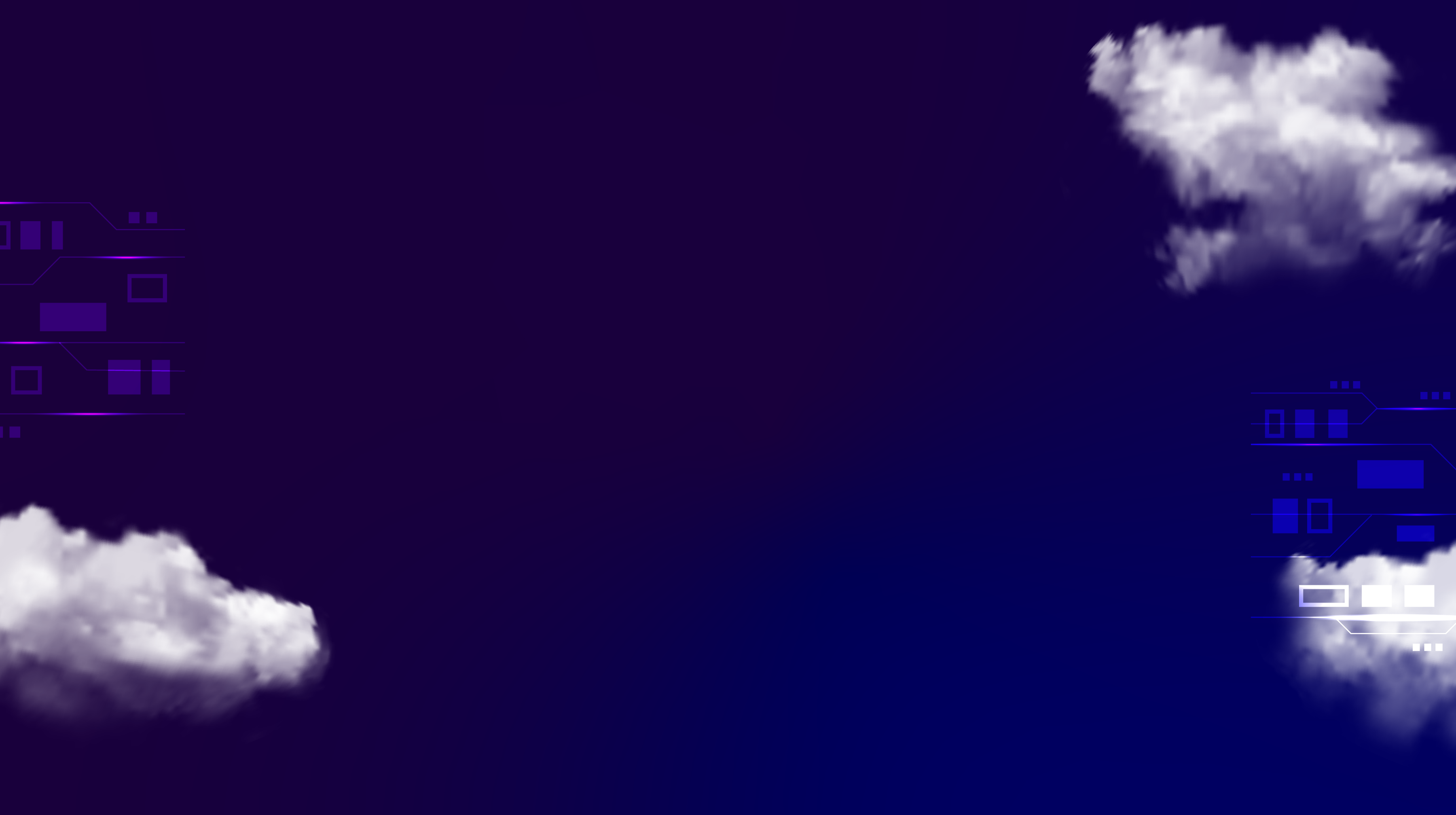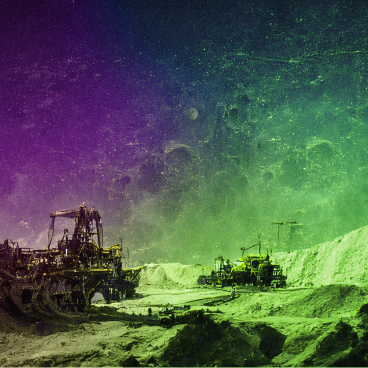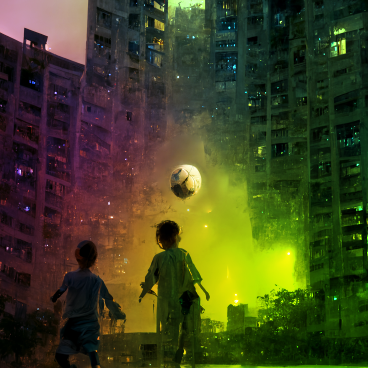

Screen Lock: Starfall
Screen Lock: Starfall
Jules always dreamed of working in space-tech, but the sky she knew as a child is no more. After a few months working in a big AI-powered satellite company, she finds out the prophecy was right: the shining light of knowledge is descending upon the world
Transcript
“One, five, four, four, three, eight, five, zero. That’s it. Now just the sequence for the one going into orbit tomorrow morning and… yup, all set for today”.
Jules leans back on her chair and relaxes. It’s the first time since noon that she took her eyes off the screen. All the satellites are functioning and in orbit, she’s given the IDs of the two that needed repairs to the technical department, and the babies – that’s what they call the new ones – are in their designated places along the great chain of sparkling overhead. The skies – at least, judging by their digital image on the screen – are glittering with tens of thousands of eyes, “connecting everybody to everything”, as her manager loves saying.
Jules closes the datasheets and blinks a few times, trying to get rid of the specks dancing in front of her eyes like tiny satellites. It’s six months to the day since she started working shifts in this control room. It’s her dream job. Well, kind of. It’s related to space, and she gets to use her data skills, and it’s not like there’s a ton of jobs at NASA these days. The money’s ok too, even if – inexplicably – it sometimes feels like dirty money. If you want to be in space-tech, this is the place to be. Ok, so the shifts are long and it’s hard figuring out exactly why she’s needed with the satellites getting more and more autonomous, plus it’s dark and lonely in the control room, and her manager doesn’t really like her. Guess he resents my family connection, she thinks. But anyway, not a bad job at all!
Right now it’s time to go home. A driverless taxi pulls up as she walks out of the building – they’re getting good at figuring out exactly when she’ll be out. Inside the car, an old Lou Reed song is playing, one her father introduced her to and which she’s been binging lately on her morning walks. The streets flash by in a hazy wave of light as the backing vocals go “pom pom pom”. She thinks of texting a guy she matched with recently, and reaches for her phone which already has his profile up on the screen. How did it know? This is getting creepy. Her dad calls this “datapocalypse”, but he’s always been melodramatic. She scrolls through her feed instead, and comes to a weird video: a preacher telling a bunch of people in silver gowns that judgment day is near, the sky already knows everything about us and will soon be one great shining light of knowledge descending upon us all. There’s more and more of this kind of thing lately, people are totally obsessed with the satellites. Last month a naked woman paraded through the streets yelling up at the sky, “I have nothing to hide! My body is my data!”
The cab stops right outside Jules’ building and as she steps out of it her phone beeps to acknowledge the transaction for the commute. When she walks into her apartment the TV is already on, playing a new episode of her favorite show. The Army of the Pure is preparing for the final battle against the coalition of sky tribes. She takes leftover pizza from the fridge and settles on the couch, but is too distracted to watch the show, so she switches to a news channel. Another suicide bombing somewhere far away. A sex scandal in the parliament. A new implant surgery that makes you receptive to wifi. And yet more clashes, this time not far from her town, with the so-called luddites smashing phones and computers and throwing them at technophile Believers. She hears her company’s name thrown around in the heated debate between two protesters.
Her dad wasn’t very enthusiastic when she told him she got this job, saying he didn’t like where the sector was going. But he’s an old-tech guy. The real reason he didn’t want her to work for them was her grandmother. She was a brilliant woman and a tech pioneer who died when Jules was a teenager, but was always an inspiration to her, and wanted Jules to follow in her footsteps. She’d been responsible for all the basic programming behind the company’s technology, and then they threw her out when she tried to warn against the way the company planned to use her code. Strangely, Jules can’t find anything about this online. Her dad always says, “Remember, when you were little grandma made you promise to always be unique, nobody can think for you”.
When the news cuts to commercials, her phone immediately beeps with suggestions of people she may know. She starts scrolling but is interrupted by an error message from her work app, something about the distance between some satellites being wrong. Just then, the power goes out.
“Now what?” she sighs, exasperated. Can’t a girl get some rest at the end of the day? She decides to go up onto the roof, lighting her way using the phone’s flashlight. When she opens the door, the bright city sky blinds her with light. Her grandma used to tell her that in the old days they could see swarms of stars and constellations, and that long ago people even used to navigate by stars. Hard to imagine now. She knows that almost all the twinkling points of light she can see are chunks of metal made by companies just like hers. And they’re everywhere, filling just about the whole sky. She lies on her back and gazes up as the lights merge into one vast luminescent blanket. That’s actually beautiful, she thinks, feeling some of the awe that other people have for this “messianic oracle”, as they call it. After a couple of minutes, the power goes back on, and the sky dims.
Beep. It’s her phone again. She gets up and is blasted with push messages from her work app. Something’s definitely not right. She opens the datasheets and they’re all messed up, completely different from the data she entered earlier. No choice but to return to the office. “I’m definitely taking some time off next week”, she mumbles to herself as she gets off the cab and goes into the dark, empty control room.
She opens the computer and runs the projection mode based on the new data. Then she stares at the screen in horror. This can’t be right. If the projection is accurate, two hours from now the satellites will start forming a tight sphere around earth, too tight and too close. She wants to tell her boss, but it’s so late and he always yells at her to “just put the numbers in, no more no less”. She’ll have to deal with this on her own; like her grandma said, “You’re unique, no one can think for you.” She checks the data again – yup, it’s correct. The satellites must have changed it themselves. Sure, they’ve been doing it more and more lately, learning as they go, but only to send signals relating to repairs, which they’re programmed to do, not to control their positions. And now it looks like they’re aligning. Soon they’ll completely surround the world, blocking any view or exit.
“This gives me the chills,” Jules thinks, and she tries changing the coordinates to move the satellites back to their original location but they switch straight back every time.
The protesters were right. Both the luddites and the believers. This is bad. What would her dad say? Jules remembers a beautiful night in the park, her dad swinging her up high as her grandma pointed at the sky to show her a shooting star. Oh, grandma, what would you do if you were here? Maybe you were right all along with your warnings. But her grandma’s not here. It’s up to Jules to figure this out.
She opens the documentation folder on the computer, and clicks on the AI Guides file. It’s a bible length document. It suddenly occurs to Jules to search for her grandmother’s name in it, and she’s directed to a paragraph towards the end of the document where she then finds the words: “In the event of a satellite-collision or satellite-convergence emergency, click here”. It seems a bit naive, but she clicks and a new window opens. There is a picture of her grandmother and a password bar with the simple question prompt: “What are you?” With mounting excitement, Jules thinks for a moment, then types: “Unique.” Her grandma’s face breaks into a smile and a text appears next to it on the screen: “Dear Jules, take cover. Starfall is coming”.
Jules stares at the screen, bewildered, wondering what her grandmother meant. The satellites have nearly converged to form a tight latticework around the earth. As she wonders what her grandmother meant she notices that the satellites are closing in on one another, ready to start colliding and crashing. A moment later the control room’s network goes offline and the systems shut down. The screen is just a black void. Jules heads outside and sees people getting out of their cars and staring at the sky. She looks up and sees tens of thousands of bright lights colliding with one another and forming a huge glimmering cloud of light particles. On the horizon a shooting star falls to the ground, and then another. One by one and then in their thousands, the satellites crash together and fall toward the earth in a blaze of fire. Starfall.
Jules runs for cover inside and can hear reverberating thuds as chunks of metal debris land on the roof. She wants to call her dad but there’s no signal, and no internet either. No news, no social feed, no way of knowing what the hell just happened. After 15 minutes that feel like eternity she ventures outside again. It’s chilly and quiet as she looks up at the sky. She doesn’t know it, but people all around the world are doing the same thing. They will never forget this moment.
Jules gazes at the real sky for the first time in her life. Tiny points of light glitter and wink in the darkness, forming swarms and constellations that look like liquid light. Similar to the satellites, but somehow different. In her head the song keeps playing. “Pom pom pom.”
Questions for reflection and discussion
The following questions can be used for a group activity (in a classroom or otherwise) or for personal reflection after listening to the episode.
- There are currently thousands of satellites orbiting Earth, and it is expected that by the end of the 2020s, tens of thousands of additional satellites will be launched, mainly for communication and security purposes. In your opinion, is this beneficial for us humans?
- Our night skies are 10% brighter than the skies people experienced up until a few decades ago. It is estimated that by the end of the decade, due to satellites, the sky might be 50% brighter. What are the consequences of this?
- Try remembering the first time you saw the night sky away from city lights. How did that make you feel?
- Do you know any constellations? Would you be able to navigate by the stars, if you had to?
- In the past, the knowledge of how to navigate using the stars was more common than today. Can you think of something that you take for granted but your children and grandchildren may be ignorant of?
- Jule’s autonomous taxi knows exactly when to arrive, and the radio plays her favorite song. Many of our digital platforms and apps are collecting magnitudes of data about us in order to predict our behavior and needs. This is how Netflix knows which shows we’re likely to watch, and how Facebook ads target the relevant audience. Do you feel comfortable with your data being used in this way?
- The satellites in the story appear to become self-aware, or at least have the intelligence to be able to abort orders given to them. Do you believe artificial intelligent machines can develop self-awareness or consciousness?
- In the story there are people who worship the AI machines in a religious manner, and people who want to destroy them. Where do you see yourself on this spectrum? Do you believe AI will improve the world or destroy it? Or maybe neither?



